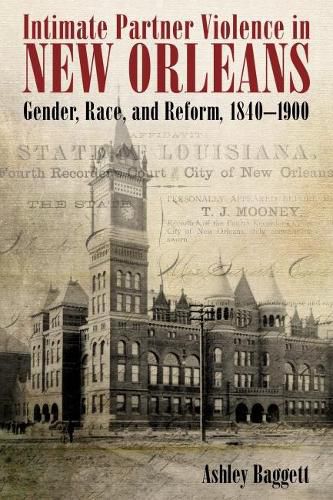Readings Newsletter
Become a Readings Member to make your shopping experience even easier.
Sign in or sign up for free!
You’re not far away from qualifying for FREE standard shipping within Australia
You’ve qualified for FREE standard shipping within Australia
The cart is loading…






This title is printed to order. This book may have been self-published. If so, we cannot guarantee the quality of the content. In the main most books will have gone through the editing process however some may not. We therefore suggest that you be aware of this before ordering this book. If in doubt check either the author or publisher’s details as we are unable to accept any returns unless they are faulty. Please contact us if you have any questions.
Ashley Baggett uncovers the voices of abused women who utilized the legal system in New Orleans to address their grievances from the antebellum era to the end of the nineteenth century. Poring over 26,000 records, Baggett analyzes 421 criminal cases involving intimate partner violence - physical or emotional abuse of a partner in a romantic relationship - revealing a significant demand among women, the community, and the courts for reform in the postbellum decades.
Before the Civil War, some challenges and limits to the male privilege of chastisement existed, but the gendered power structure and the veil of privacy for families in the courts largely shielded abusers from criminal prosecution. However, the war upended gender expectations and increased female autonomy, leading to the demand for and brief recognition of women’s right to be free from violence. Baggett demonstrates how postbellum decades offered a fleeting opportunity for change before the gender and racial expectations hardened with the rise of Jim Crow.
Her findings reveal previously unseen dimensions of women’s lives both inside and outside legal marriage and women’s attempts to renegotiate power in relationships. Highlighting the lived experiences of these women, Baggett tracks how gender, race, and location worked together to define and redefine gender expectations and legal rights. Moreover, she demonstrates recognition of women’s legal personhood as well as differences between northern and southern states’ trajectories in response to intimate partner violence during the nineteenth century.
$9.00 standard shipping within Australia
FREE standard shipping within Australia for orders over $100.00
Express & International shipping calculated at checkout
This title is printed to order. This book may have been self-published. If so, we cannot guarantee the quality of the content. In the main most books will have gone through the editing process however some may not. We therefore suggest that you be aware of this before ordering this book. If in doubt check either the author or publisher’s details as we are unable to accept any returns unless they are faulty. Please contact us if you have any questions.
Ashley Baggett uncovers the voices of abused women who utilized the legal system in New Orleans to address their grievances from the antebellum era to the end of the nineteenth century. Poring over 26,000 records, Baggett analyzes 421 criminal cases involving intimate partner violence - physical or emotional abuse of a partner in a romantic relationship - revealing a significant demand among women, the community, and the courts for reform in the postbellum decades.
Before the Civil War, some challenges and limits to the male privilege of chastisement existed, but the gendered power structure and the veil of privacy for families in the courts largely shielded abusers from criminal prosecution. However, the war upended gender expectations and increased female autonomy, leading to the demand for and brief recognition of women’s right to be free from violence. Baggett demonstrates how postbellum decades offered a fleeting opportunity for change before the gender and racial expectations hardened with the rise of Jim Crow.
Her findings reveal previously unseen dimensions of women’s lives both inside and outside legal marriage and women’s attempts to renegotiate power in relationships. Highlighting the lived experiences of these women, Baggett tracks how gender, race, and location worked together to define and redefine gender expectations and legal rights. Moreover, she demonstrates recognition of women’s legal personhood as well as differences between northern and southern states’ trajectories in response to intimate partner violence during the nineteenth century.